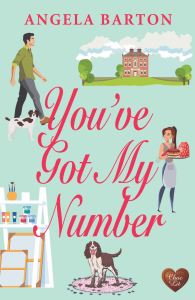
It’s a real pleasure today to be joining the blog tour for You’ve Got My Number by Angela Barton, published by Choc Lit on 18th February, now available for kindle via Amazon in the UK and US, and also on all other major e-book platforms and as an audio download. My thanks to Rachel at Rachel’s Random Resources for the invitation and support.
I’m really kicking myself that I just couldn’t fit in the reading of this lovely-looking book ahead of the blog tour – so sorry, Angela! But I’ve really enjoyed her two earlier books: you’ll find my review of the wonderful Arlette’s Story here (and it was one of my books of the year in 2018), and I also very much enjoyed Magnolia House (you’ll find my review here). But let’s take a closer look at her latest…
Three isn’t always a magic number…
There are three reasons Tess Fenton should be happy. One, her job at the Blue Olive deli may be dull, but at least she gets to work with her best friend. Two, she lives in a cosy cottage in the pretty village of Halston. Three, she’s in love with her boyfriend, Blake.
Isn’t she?
Because, despite their history, Blake continues to be the puzzle piece in Tess’s life that doesn’t quite fit. And when she meets intriguing local artist Daniel Cavanagh, it soon becomes apparent that, for Tess, love isn’t as easy as one, two, three…

I’ve always been a particular advocate of reading as a means of escape from life’s sometimes difficult realities, and I’m delighted to welcome Angela as my guest today with a slightly different slant – an excellent guest post on using the written word as an outlet for negative emotions.
Writing, like reading, is a means of escape. I strongly believe that creative writing is a curative pathway, an instrument of healing. It’s a safe outlet for negative emotions such as grief, anger, jealousy or anxiety. It safely helps us to explore our emotions, the reasons behind them and hopefully, find a solution through role-play using the written word. By sharing negative emotions with my fictional characters, I’m distancing myself from my own heightened feelings. I was able to express anger through writing towards the end of You’ve Got My Number. I have a calm personality and very rarely get angry so I would have found it difficult in reality. I’d been deeply hurt by a loved one and my trust had been broken. I simply gave my problem to Tess, my protagonist in YGMN, and while I sought a solution and helped her to regulate her emotions, by default, I was doing the same for myself.
For me, writing helps to organize my thoughts and gives meaning to difficult experiences. In Magnolia House and Arlette’s Story, I expressed grief following the death of my father. Having a mild obsessive compulsion, writing helped me to process why I focus on the number three and why it makes me feel safe. So once again, I gave the same obsession to my hero, Daniel, in You’ve Got My Number. He and Tess spoke about the problem and in talking about it and facing it head on, Daniel began to manage his fears.
Creative writing helps to release anger in a healthy, productive away that utilises our mental capabilities, rather than draining us physically. Novel writing is a typically longer way of negotiating your emotions. I’ve found that filtering my emotions on to a page has been a positive experience for me. The efficacy of using the written word as a mode of coping for suffering is wholly dependent on how you prefer to process grief. Many unconsciously bottle up their emotions and release them in one explosion of anger and sadness when they reach the climax of a story, while others slowly uncover their emotions through using their characters to discuss them between themselves.
If you prefer to eradicate negative emotions as quickly as possible and don’t like to linger on the bad feelings associated with them, then choosing to write out your feelings over weeks or months may make you uncomfortable – in which case, a diary entry or journal may be a better option for you. On the other hand, if taking your emotions and implementing them in a long piece of work is more your style, then perhaps applying them to a narrative will be more cathartic for you.
Whatever way you choose as a coping strategy when things go wrong, please don’t choose to bottle up your emotions and pretend they don’t exist. Like the genie in the bottle, they have a way of sneaking up on you later. Talk, write, compose, paint… but let it out.
I love that post – thank you Angela! And I wish you every possible success with You’ve Got My Number…
About the author

Angela Barton lives in Nottingham and is a member of Nottingham Writers’ Studio and the Romantic Novelists’ Association. She has written three novels, all of which have passed through the RNA’s New Writers’ Scheme and are now published.
Her first novel was published in 2018. Its genre is historical fiction set in France, telling the story of how a farming family survive through WW2. Angela’s second and third books are contemporary women’s fiction.
Now busy writing her fourth book, also set in France during wartime, Angela’s new passion is to research real life happenings and create fictional characters that live through these extraordinary events.
Along with other authors, Angela has helped to create two Facebook groups for book lovers, Apricot Plots and Love Forties Fiction.

Great post, thank you both for writing and featuring it xx